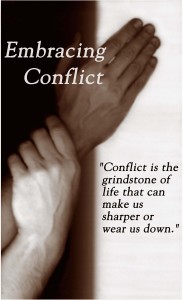 The bottom-line cost to avoiding conflict is tremendous, but few people are taught how to be effective with conflict. My introduction to the subject surfaced just out of college when I discovered I did not have sufficient tools to deal with conflict on the job. Promoted to manager of a retail store with one of the highest levels of shoplifting in the city, I decided I’d better learn about conflict pronto.
The bottom-line cost to avoiding conflict is tremendous, but few people are taught how to be effective with conflict. My introduction to the subject surfaced just out of college when I discovered I did not have sufficient tools to deal with conflict on the job. Promoted to manager of a retail store with one of the highest levels of shoplifting in the city, I decided I’d better learn about conflict pronto.
That was the start of my training in the martial art of Aikido, which views physical conflict as a state of imbalance. It teaches that we become stronger in the process of transforming conflict. In Aikido, instead of trying to be stronger than your attacker, you come from a centered place and then meet them, blend with them and ultimately lead them to a place that does little or no harm to the attacker. You are responsible for your own well-being and that of the attacker. When I mapped these principles on to the conflicts that occurred in my retail store, I discovered that I not only resolved the conflicts but also developed more loyal customers and trusted friends.
Later when I joined IBM, I had become so adept at handling conflict that a manager from upstate New York flew in to meet the customer service rep—me– who “liked having people yell at him and could save large contracts.”
So what are the core principles I discovered?
1. Understand their upset.
Treating conflict with calm controlled behavior is like putting gasoline on a fire. If you have ever been really upset and someone kept telling you to calm down, what did it do? Yes, you need to come from a centered, grounded place, but you need to move into their world to understand that their concern is real for them. The quicker you can validate it in an authentic way, the quicker you can move them to a more harmonious win-win solution.
2. Get clear on your commitment.
Are you committed to looking good? Being right? To winning? If so, you are almost guaranteed to lose. More productive commitments might be enhancing the relationship, giving the best service, or finding the gem of value in every criticism. Of course when you’re upset or rattled by a conflict it’s hard to remember what you are committed to. I recommend the Aikido technique of breathing deeply, becoming centered by putting your attention on your center of balance (about 2 inches below the navel).
3. Enter their world.
Next blend with your opponent to see through their eyes and allow yourself to become concerned to approach their concern. You truly validate their issue by understanding it, not justifying or giving “good reasons.” From there, with a clear commitment, work with them to create a new solution that aligns with your commitment and addresses their concern.
4. Assume positive intention.
Stay engaged with them until it is resolved. This requires you to develop the ability to be with other people’s upset and not lose your own commitment. At IBM there was a client who was so hard to deal with that they passed her on to me. She was a small, aggressive woman with great influence in many departments. When I came in she would meet me part way and start yelling about the current problem. “How can you work for a company that builds junk like this!” I would simply start listening, but really listening like I wanted to be part of the story. One observer said that when she yelled at me she would be shaking up and down and it almost looked like I was doing the same while listening to her. As she continued complaining I would ask if there was anything else–and there always was. Then, surprisingly, after a few minutes of this she would suddenly get quiet, turn her head to the side, and ask cheerfully, “Do you want a Coke?” I would say yes, adding that while she was getting it for me I would start working on the machine. The account was saved and I managed it for several years.
By avoiding dealing with conflict we miss building character. We miss the chance to transform an adversary into a loyal customer. And we miss the deepened relationships that can be found on the other side of a conflict when we choose to do more than manage conflict and actually embrace it. Don’t miss those opportunities!
c2014 –Martin Brossman – (919) 847-4757 – Martin offers professional development training on this and other topics that can be found by going here.